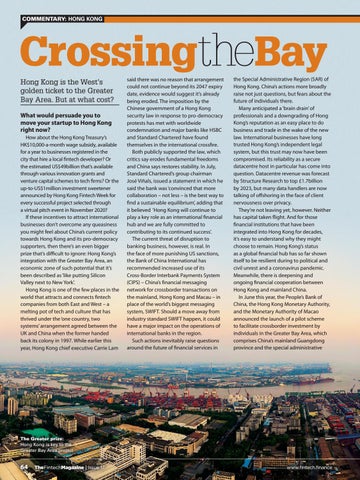COMMENTARY: HONG KONG
CrossingtheBay Hong Kong is the West’s golden ticket to the Greater Bay Area. But at what cost? What would persuade you to move your startup to Hong Kong right now? How about the Hong Kong Treasury’s HK$10,000-a-month wage subsidy, available for a year to businesses registered in the city that hire a local fintech developer? Or the estimated US$49billion that’s available through various innovation grants and venture capital schemes to tech firms? Or the up-to-US$1million investment sweetener announced by Hong Kong Fintech Week for every successful project selected through a virtual pitch event in November 2020? If these incentives to attract international businesses don’t overcome any queasiness you might feel about China’s current policy towards Hong Kong and its pro-democracy supporters, then there’s an even bigger prize that’s difficult to ignore: Hong Kong’s integration with the Greater Bay Area, an economic zone of such potential that it’s been described as ‘like putting Silicon Valley next to New York’. Hong Kong is one of the few places in the world that attracts and connects fintech companies from both East and West – a melting pot of tech and culture that has thrived under the ‘one country, two systems’ arrangement agreed between the UK and China when the former handed back its colony in 1997. While earlier this year, Hong Kong chief executive Carrie Lam
said there was no reason that arrangement could not continue beyond its 2047 expiry date, evidence would suggest it’s already being eroded. The imposition by the Chinese government of a Hong Kong security law in response to pro-democracy protests has met with worldwide condemnation and major banks like HSBC and Standard Chartered have found themselves in the international crossfire. Both publicly supported the law, which critics say erodes fundamental freedoms and China says restores stability. In July, Standard Chartered’s group chairman José Viñals, issued a statement in which he said the bank was ‘convinced that more collaboration – not less – is the best way to find a sustainable equilibrium’, adding that it believed ‘Hong Kong will continue to play a key role as an international financial hub and we are fully committed to contributing to its continued success’. The current threat of disruption to banking business, however, is real. In the face of more punishing US sanctions, the Bank of China International has recommended increased use of its Cross-Border Interbank Payments System (CIPS) – China’s financial messaging network for crossborder transactions on the mainland, Hong Kong and Macau – in place of the world’s biggest messaging system, SWIFT. Should a move away from industry standard SWIFT happen, it could have a major impact on the operations of international banks in the region. Such actions inevitably raise questions around the future of financial services in
the Special Administrative Region (SAR) of Hong Kong. China’s actions more broadly raise not just questions, but fears about the future of individuals there. Many anticipated a ‘brain drain’ of professionals and a downgrading of Hong Kong’s reputation as an easy place to do business and trade in the wake of the new law. International businesses have long trusted Hong Kong’s independent legal system, but this trust may now have been compromised. Its reliability as a secure datacentre host in particular has come into question. Datacentre revenue was forecast by Structure Research to top £1.7billion by 2023, but many data handlers are now talking of offshoring in the face of client nervousness over privacy. They’re not leaving yet, however. Neither has capital taken flight. And for those financial institutions that have been integrated into Hong Kong for decades, it’s easy to understand why they might choose to remain. Hong Kong’s status as a global financial hub has so far shown itself to be resilient during to political and civil unrest and a coronavirus pandemic. Meanwhile, there is deepening and ongoing financial cooperation between Hong Kong and mainland China. In June this year, the People’s Bank of China, the Hong Kong Monetary Authority, and the Monetary Authority of Macao announced the launch of a pilot scheme to facilitate crossborder investment by individuals in the Greater Bay Area, which comprises China’s mainland Guangdong province and the special administrative
The Greater prize: Hong Kong is key to the Greater Bay Area project
64
TheFintechMagazine | Issue 17
www.fintech.finance
